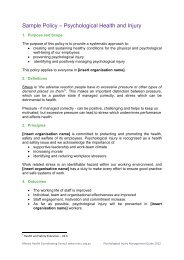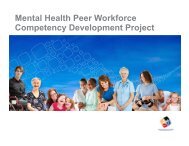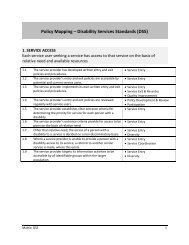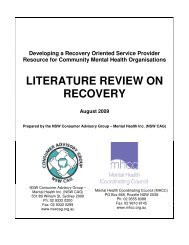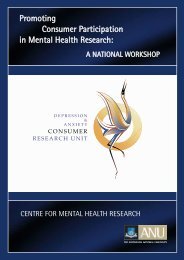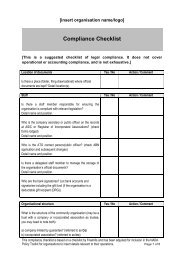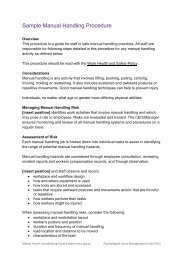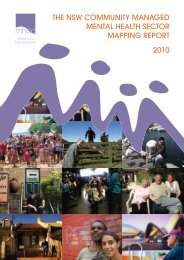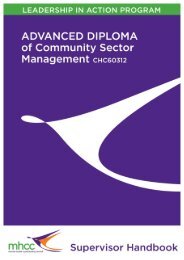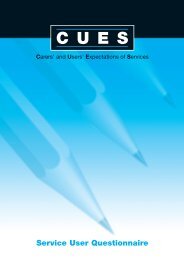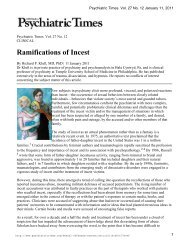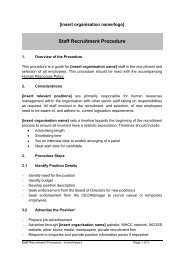Recovery Oriented Language Guide - The MHCC Policy Resource ...
Recovery Oriented Language Guide - The MHCC Policy Resource ...
Recovery Oriented Language Guide - The MHCC Policy Resource ...
- No tags were found...
Create successful ePaper yourself
Turn your PDF publications into a flip-book with our unique Google optimized e-Paper software.
eedsDIFFICULTCONTROLCHALLENGINGEHAVIOURlistensupportrecoveryTREATMENTstrengthchooseCONTROL DIFFICULTsupportRESISTANTchoosepositiveCHALLENGINGneedsRECOVERY ORIENTED LANGUAGE GUIDETREATMENTDIFFICULT recoveryperson-centredexperienceBEHAVIOURlistenCONTROLpositive
First edition - <strong>Recovery</strong> <strong>Oriented</strong> <strong>Language</strong> <strong>Guide</strong>© Mental Health Coordinating Council 2013For further information please contact:Tina SmithSenior <strong>Policy</strong> Officer-Workforce DevelopmentMental Health Coordinating Counciltina@mhcc.org.au
<strong>MHCC</strong> <strong>Recovery</strong> <strong>Oriented</strong><strong>Language</strong> <strong>Guide</strong>“Words are important. <strong>The</strong> language we use and the stories we tell havegreat significance to all involved. <strong>The</strong>y carry a sense of hope and possibilityor can be associated with a sense of pessimism and low expectations, bothof which can influence personal outcomes”. 1<strong>The</strong> Mental Health Coordinating Council (<strong>MHCC</strong>) has developed this <strong>Recovery</strong> <strong>Oriented</strong> <strong>Language</strong><strong>Guide</strong> because language matters in mental health. We must use words that convey hope andoptimism and that support, and promote a culture that supports, recovery. 2People with psychosocial disabilities are amongst some of the most marginalised in the Australiancommunity and many live with poverty, discrimination and social isolation as a normal part of theirlives. 3 <strong>The</strong> words that we use when speaking with people are a critical tool to ensure that all we areable to engage with and effectively respond to issues of prejudice, stigma and discrimination, whichcan erode human rights and result in disadvantage and social exclusion.<strong>The</strong> terms psychosocial and psychiatric disability are often used interchangeably. Psychosocialdisability is now the preferred term and it is used by the United Nations Convention on the Rights ofPeople with Disabilities as it acknowledges the often devastating impacts on – for example – housing,employment and relationships that people affected by mental illness/distress can experience. 4Development of the <strong>Language</strong> <strong>Guide</strong> has been informed by a number of sources including: currentliterature on recovery orientated practice; conversations with people working in the mental healthsector; and, most importantly, the voices of people with lived experience of mental illness andrecovery.<strong>The</strong> <strong>Language</strong> <strong>Guide</strong> underpins <strong>MHCC</strong>’s Organisation Builder (MOB) <strong>Policy</strong> <strong>Resource</strong> andorganisations providing recovery oriented and trauma-informed services to people affected bymental/emotional distress are encouraged to also adopt it.<strong>The</strong> MOB <strong>Policy</strong> <strong>Resource</strong> makes available more than 200 policies, procedures and other supportingdocuments to help improve the quality and effectiveness of recovery oriented service delivery,including a template for this <strong>Language</strong> <strong>Guide</strong> that might be adopted for use within your organisation.<strong>The</strong> <strong>Language</strong> <strong>Guide</strong> template is available as a complement to the “Valued Status <strong>Policy</strong>” in the“Prevention and Promotion” category of the MOB <strong>Policy</strong> <strong>Resource</strong>.<strong>The</strong> MOB <strong>Policy</strong> <strong>Resource</strong> can be accessed at the <strong>MHCC</strong> website: http://mob.mhcc.org.au1 Devon Partnership Trust and Torbay Care Trust (2008, p. 2).2 Department of Health and Ageing (2012).3 National Mental Health Consumer & Carer Forum (N<strong>MHCC</strong>F, 2011).4 United Nations General Assembly (2006).<strong>Recovery</strong> <strong>Oriented</strong> <strong>Language</strong> <strong>Guide</strong> © 2013 Mental Health Coordinating Council 1
<strong>Guide</strong>lines for <strong>Recovery</strong> <strong>Oriented</strong><strong>Language</strong> 5General PrinciplesOur language:• Represents the meanings we have constructed from experience• Prompts attitudes, expectations and actions• Should always reflect unconditional positive regard for people.We may be unaware of the impact our words have on our attitudes as well as upon thosearound us.<strong>The</strong> words we choose reflect our attitudes; that we do (or do not) truly value people, believe inand genuinely respect them.None of us should be defined by our difficulties or diagnoses, or by any single aspect of whowe are; we are people first and foremost.Our language needs to be:• Respectful• Non-judgemental• Clear and understandable• Free of jargon, confusing data, and speculation• Carrying a sense of commitment, hope and presenting the potential for opportunity.We need to give thought to:• How our language is read/heard by the person to whom we are referring, and couldpositively contribute to their health and wellbeing (or otherwise)• What meanings we present to people to live by.Our language conveys thoughts, feelings, facts and information, but beyond that,we need to ask ourselves questions like:• What else am I saying?• How will someone else read/hear this?• Do I give a sense of commitment, hope and present opportunity or a sense of pessimism?• Do I convey an awareness and expectation of recovery?5 Adapted from Roberts and <strong>The</strong>kkepalakkal (2009).2<strong>Recovery</strong> <strong>Oriented</strong> <strong>Language</strong> <strong>Guide</strong> © 2013 Mental Health Coordinating Council
Some General <strong>Guide</strong>lines 6DODON’TDO put people first:DO say “person with mental illness”.DO say “a person diagnosed with …”.DON’T label people:DON’T say “he/she is mentally ill”.DON’T define the person by their struggle ordistress.DON’T equate the person’s identity with adiagnosis.Very often there is no need to mention adiagnosis at all. It is sometimes helpful to usethe term “a person diagnosed with”, becauseit shifts the responsibility for the diagnosis tothe person making it, leaving the individualthe freedom to accept it or not.DO emphasise abilities.DO focus on what is strong.i.e., the person’s strengths, skills & passionsDON’T emphasise limitations.DON’T focus on what is (in your mind) wrong.DO use language that conveys hope andoptimism that supports, and promotes aculture that supports, recovery.DON’T use condescending, patronising,tokenistic, intimidating or discriminatinglanguage. 7DON’T sensationalise a mental illness.This means not using terms such as“afflicted with”, “suffers from”, or “is avictim of”.DON’T portray successful people withmental illness as superhuman.This carries the assumption that it is rare forpeople with mental illness to achieve greatthings.DO enquire as to how the person would like tobe addressed.DON’T presume that a person wants to becalled by a particular term (e.g., consumer orclient) and check whether by their family or firstname (e.g., Ms Smith or Kylie).6 Adapted from Wahl (2010).7 Burge, M. (2010).<strong>Recovery</strong> <strong>Oriented</strong> <strong>Language</strong> <strong>Guide</strong> © 2013 Mental Health Coordinating Council3
<strong>Language</strong> promoting acceptance,hope, respect & uniqueness 8VSOutdated andworn-out words<strong>Language</strong> for Acceptance, Hope,Respect & UniquenessWorn-out Words• Kylie does not have an illness/disability• Kylie is normal• Sam lives with/has a mental illness• Sam has schizophrenia• Sam has been diagnosed with bipolar disorder• Sam has experienced anorexia• Sam is a person with/who…• Sam is mentally ill• Sam is schizophrenic• Sam is a bipolar• Sam is an anorexic• Sam is …• Kylie is having a rough time• Kylie is having difficulty with her recommendedmedication• Kylie is experiencing …• Kylie is decompensating• Kylie is resistant/non-compliantwith her meds• Kylie is...• Sam is trying really hard to get his needs met• Sam may need to work on more effective ways ofgetting his needs met• Sam is manipulative• Sam has challenging/complexbehaviours• Kylie is choosing not to…• Kylie would rather…• Kylie is non-compliant• Kylie has poor/no insight• Kylie is looking for other options• Sam is excited about the plan we’ve developedtogether• Sam is working hard towards the goals he has set• Sam is very compliant/manageable• Sam has insight• Kylie chooses not to…• Kylie prefers not to…• Kylie is resistant to treatment• Kylie is treatment resistant• Kylie seems unsure about…8 Adapted from Wahl (2010).4<strong>Recovery</strong> <strong>Oriented</strong> <strong>Language</strong> <strong>Guide</strong> © 2013 Mental Health Coordinating Council
<strong>Language</strong> for Acceptance, Hope,Respect & UniquenessWorn-out Words• Sam is really good at… • Sam is high functioning• Kylie has a tough time taking care of herself• Kylie is low functioning• Kylie has a tough time learning new things• Kylie is still early in her recovery journey• Sam tends to (describe actions, e.g., hit people) whenhe is upset• Sam sometimes kicks people when he is hearingvoices• Sam is dangerous• Sam has challenging/high riskbehaviour/s• Sam is high risk• Kylie is experiencing co-existing mental health andsubstance use/abuse problems• Kylie is dually diagnosed• Kylie has comorbidities• Kylie is MICA/MISA (mentally illchemically abusing, mentally illsubstance abusing)• Kylie is an addict• Sam doesn’t seem ready to go back to work• Sam is not in an environment that motivates him• Sam is working on finding his motivation• Sam has not yet found anything that sparks hismotivation• Sam is unmotivated• Sam is not engaged/does not wantto be engaged• Sam isolates• Kylie has a lot of energy right now• Kylie is manic• Kylie hasn’t slept in three days• Sam is experiencing a lot of fear• Sam is worried that his neighbours want to hurt him• Sam is paranoid• Sam is delusional<strong>Recovery</strong> <strong>Oriented</strong> <strong>Language</strong> <strong>Guide</strong> © 2013 Mental Health Coordinating Council5
<strong>Language</strong> for Acceptance, Hope,Respect & UniquenessWorn-out Words• Kylie has been working towards recovery for a longtime• Kylie has experienced depression for many years• Kylie has a chronic mental illness• Kylie is chronic• Kylie will never recover• Sam and I aren’t quite on the same page• It is challenging for me to work with Sam• Sam is very difficult• Sam has challenging behaviour• Sam won’t engage with servicesIf worn-out words are used to describe people’sattempts to reclaim some shred of power while beingserviced by a system that may try to control them thenimportant opportunities to support a person’s recoverywill be lost.<strong>The</strong> person is trying to get their needs met - or has aperception or opinion different from, or not shared by,others - and their actions are not yet effectively bringingthem to the result they want.• Manipulative• Grandiose• In denial• Passive aggressive• Self-defeating• Oppositional• Personality disordered• Mentally impairedTalking About Suicide 9Suicide is not a crime. We now live in a time when we seek to understand people who have suicidalthoughts, feelings and behaviours, and the language we use assists in this.Appropriate WordsWorn-out Words• Died by suicide• Suicided• Ended his/her life, took his/her own life• Non-fatal attempt at suicide• Attempt to end his/her own life• Committed suicide• Successful suicide• Completed suicide• Failed attempt at suicide• Unsuccessful suicide9 Beaton, S. Forster P. and Maple M. (2013).6<strong>Recovery</strong> <strong>Oriented</strong> <strong>Language</strong> <strong>Guide</strong> © 2013 Mental Health Coordinating Council
Specific <strong>Guide</strong>lines1. Speak or write about a person with an illness, psychosocial disability, problem and/ordifficulty; not about a disorder, diagnosis, symptom/s and/or case.2. Include a description of a person’s strengths and resources alongside difficulties.3. Where applicable, explicitly own words and concepts such as diagnosis or assessment asfrom a medical/service provider opinion/perspective rather than as a pronouncement ofuniversal truth.4. Record people’s progress and their efforts and engagement with their ownrecovery.5. Where there are different views between the person writing a letter/report andthe person, it is important to:• include recognition of that awareness• describe their viewpoint in their own words and• describe how their viewpoint contrasts with the author’s.For example, “whereas I think ... I’m aware that Sam has a very different point of view andconsiders/stated that ...”• Note directions for negotiating these differences6. Express “shortfalls” as work or progress still to be achieved.7. Record the person’s own hopes or ambitions as well as those held by the supportteam and what needs to happen for such hopes to be realised.8. Seek to express issues of risk (safety and risk management) in terms of planning forrecovery, safety and success; including for people who may be required to receiveinvoluntary treatment.9. When actions are suggested that the person disagrees with, give a clear reason forwhy these are considered necessary in terms of supporting someone’s recovery andacknowledge their alternate view.10. When there is opportunity, such as for Mental Health Review Tribunal reports:• always offer a developed draft to the person• offer to review and respond to their views on what you have written• where there are significantly different viewpoints consider how these can be includedeither by amending what you have written if it is acceptable to you or by including theperson’s alternate viewpoint.<strong>Recovery</strong> <strong>Oriented</strong> <strong>Language</strong> <strong>Guide</strong> © 2013 Mental Health Coordinating Council7
Specific <strong>Guide</strong>lines11. Be aware that letters and reports are constructions rather than objectivedescriptions. Where possible, write reports with the person they are about, while atthe same time preserving the integrity and authenticity of your own viewpoint.12. Where there is a practice of offering people copies of letters written about themconsider if the letter could instead be written directly to the person it is about –as a record of the conversation and a reminder of decisions – and copied to theother relevant parties (e.g., peer workers, support workers, general practitioners).13. Set up recovery oriented language prompts in organisational documents anddata templates, and include in continuous improvement audit processes (e.g., <strong>MHCC</strong>Organisation Builder - <strong>Policy</strong> <strong>Resource</strong> and ROSSAT). 10And, most importantly, always remember:• <strong>Recovery</strong> – is a journey undertaken by people with lived experience of mental illness/emotional distress• <strong>Recovery</strong> oriented practice/service provision – is how workers and services supportpeople in their individual recovery journey.This <strong>Language</strong> <strong>Guide</strong> was developed primarily for community service and health workers.However, to overcome social exclusion we need to also encourage use of language that supportsrecovery by other people in our broader community and workplaces.10 NSW Consumer Advisory Group - Mental Health Inc. and <strong>MHCC</strong> (2011).8<strong>Recovery</strong> <strong>Oriented</strong> <strong>Language</strong> <strong>Guide</strong> © 2013 Mental Health Coordinating Council
ReferencesPrimary References:• Beaton, S. Forster P. and Maple M. (2013). Suicide and <strong>Language</strong>: Why We Shouldn’t Use the‘C’ Word. In Psych: Australian Psychological Society (February).• Burge, M. /Consumer Advocate (2010). Exerpt from speech given at <strong>The</strong>MHs Conference 2010.• Department of Health and Ageing (2012, draft). National <strong>Recovery</strong> <strong>Oriented</strong> Mental HealthPractice Framework.• Devon Partnership Trust and Torbay Care Trust (2008). Putting <strong>Recovery</strong> at the Heart of AllWe Do.• NSW Consumer Advisory Group – Mental Health Inc. and Mental Health Coordinating Council(2011). <strong>Recovery</strong> <strong>Oriented</strong> Service Self-Assessment Toolkit (ROSSAT): A <strong>Recovery</strong> <strong>Resource</strong> forMental Health Community Managed Organisations Project – Final Project Report.• National Mental Health Consumer & Carer Forum (2011). Unravelling Psychosocial Disability: APosition Statement by the National Mental Health Consumer & Carer Forum on PsychosocialDisability Associated with Mental Health Conditions.• Roberts, G. and <strong>The</strong>kkepalakkal, A. (2009). Developing <strong>Recovery</strong> <strong>Oriented</strong> Practice - A <strong>Guide</strong> toWriting Reports and Letters: <strong>Recovery</strong> and Independent Living PEG Advisory Paper 9.Devon Partnership Trust, UK.• United Nations General Assembly (2006). Convention on the Rights of Persons withDisabilities.• Wahl, O. (2010). <strong>Recovery</strong> <strong>Language</strong>.Secondary References/Other Recommended Reading:• Community Mental Health Australia (2012). Taking Our Place – Community Mental HealthAustralia: Working Together to Improve Mental Health in the Community.• Brown, W. & Kandirikirira, N. (2007). Recovering Mental Health in Scotland. Report on NarrativeInvestigation of Mental Health <strong>Recovery</strong>. Glasgow, Scottish <strong>Recovery</strong> Network.• National Mental Health Commission (2012). A Contributing Life: the 2012 National Report Cardon Mental Health and Suicide Prevention.• Slade, M. (2009). 100 Ways to Support <strong>Recovery</strong>: A <strong>Guide</strong> for Mental Health Professionals.• Walker, M.T. (2006). <strong>The</strong> Social Construction of Mental Illness and its Implications for the<strong>Recovery</strong> Model. International Journal of Psychosocial Rehabilitation. 10 (1), 71-87.• World Network of Users and Survivors of Psychiatry (WNUSP), (2008). Implementation Manualfor the United Nations Convention on the Rights of Persons with Disabilities.<strong>Recovery</strong> <strong>Oriented</strong> <strong>Language</strong> <strong>Guide</strong> © 2013 Mental Health Coordinating Council9
CONTACT USPO Box 668 RozelleNSW 2039T 02 95558388F 02 98108145E info@mhcc.org.auW www.mhcc.org.au



